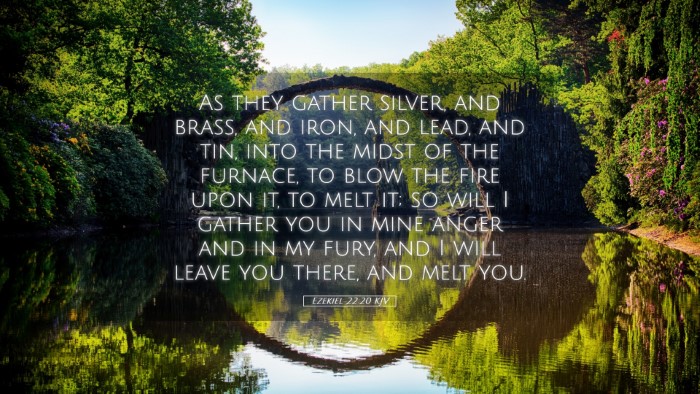Bible Commentary on Ezekiel 22:20
Ezekiel 22:20 states:
"As they gather silver and brass and iron and lead and tin into the midst of the furnace, to blow the fire upon it, to melt it; so will I gather you in mine anger and in my fury, and I will leave you there, and melt you."
Contextual Overview
This verse is part of a larger passage where God, through the prophet Ezekiel, addresses the judgments that will befall Jerusalem and the people of Israel due to their persistent sins, corruption, and idolatry. The imagery of melting metals in a furnace serves as a vivid representation of divine judgment and purification.
Interpretative Insights
Symbolism of Metals
In this passage, the metals—silver, brass, iron, lead, and tin—represent different facets of human value and materialism. The act of gathering them can be seen as collecting what people hold dear. However, God's use of fire is a metaphor for judgment; it signifies purification through trials. Just as metals are refined through heat, the people of Israel are called to undergo severe trials to purge their iniquities and refine their faith.
Divine Anger and Judgment
Following insights from Matthew Henry, it is clear that the phrase "gather you in mine anger" is deeply significant. It indicates a period where God's patience has worn thin. The judgment is not impulsive but rather the culmination of ongoing disobedience and idol worship. As Henry elucidates, the wrath of God is not capricious; it is just and measured. God's response to sin reveals His holiness and integrity.
The Process of Melting
Albert Barnes provides thoughtful commentary on the process of melting and gathering in a furnace. He draws parallels between physical melting and spiritual trials faced by the faithful. Just as metals are purified by fire, believers will face trials that refine their character and faith. This hearkens to the New Testament teachings of suffering yielding perseverance, character, and hope (Romans 5:3-5).
The Nature of God’s Fury
Adam Clarke emphasizes the severity of God’s fury in this passage. It is described as a purging fire, meant not for arbitrary punishment but for the transformation of the people. Clarke notes that God’s wrath is directed towards sin, not the sinner—if the sinner repents, the purging can lead to restoration. Thus, the gathering into the furnace serves both as a warning and an avenue for grace.
Theological Implications
Purification through Judgment
The theological implications are far-reaching. This text prefigures the need for spiritual purification through profound trials and tribulations. God's judgment, though fierce, is ultimately aimed at cleansing His people, reminiscent of passages throughout Scripture that discuss refining and pruning (John 15:2). The ‘furnace’ symbolizes the necessary but painful processes by which God transforms His people.
The Call to Repentance
This passage serves as a call to action for the faithful. It suggests that understanding God's judgment is vital for repentance. Both Barnes and Clarke assert that acknowledgment of wrongdoing leads to divine mercy. The depiction of God melting His people is instructional, urging them to seek reform before the inevitable consequences of their actions manifest.
Holiness of God
The holiness of God is a central theme in Ezekiel's writings. The fiery furnace imagery underscores God's righteousness and the necessity of sin being dealt with appropriately. As Matthew Henry highlights, God’s holiness requires that He cannot overlook sin. Pastors and theologians must understand this aspect of God’s character to effectively teach and guide their congregations.
Application for Today's Believers
The insights from this passage are applicable for contemporary Christians, urging them to evaluate both personal and communal life in light of potential lapses into sin. Pastors can draw from this commentary to lead discussions on the importance of repentance and the refining work of trials.
The Role of Community
Like Israel, the modern church faces challenges and temptations. This commentary emphasizes a communal aspect—studying Scripture together and holding one another accountable entwines with the purpose of being refined. The corporate gathering before God leaves room for collective repentance.
Encouragement through Trials
Moreover, when believers undergo hardships, they can be encouraged by the knowledge that such trials may be part of God's refining process. As Clarke implies, believers should look for purpose in their suffering—seeing trials as opportunities for glorifying God and affirming their faith.
Conclusion
In summary, Ezekiel 22:20 reflects the solemn yet hopeful truth of God’s judgment as a pathway to purification. The imagery of gathering and melting offers rich, multifaceted insights that reveal God's response to sin, His commitment to justice, and His desire for the ultimate restoration of His people.
This passage serves as a reminder for every believer of the importance of keeping a contrite heart and the necessity of yielding to God’s workings to experience true holiness. In embracing both the fear of divine judgment and the hope of spiritual rebirth, we find profound encouragement to walk faithfully in God's ways.


